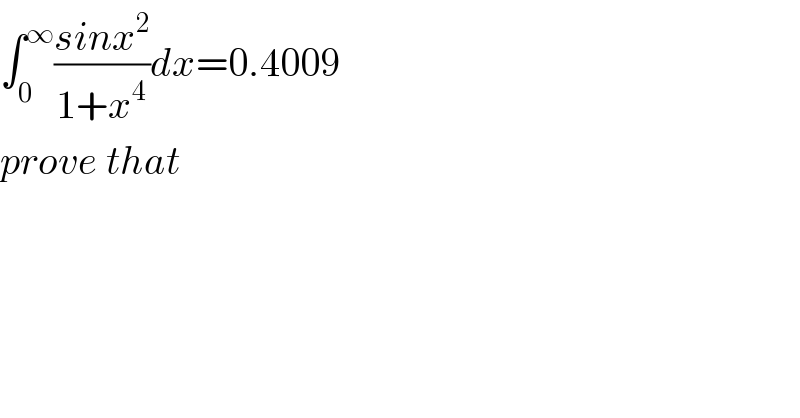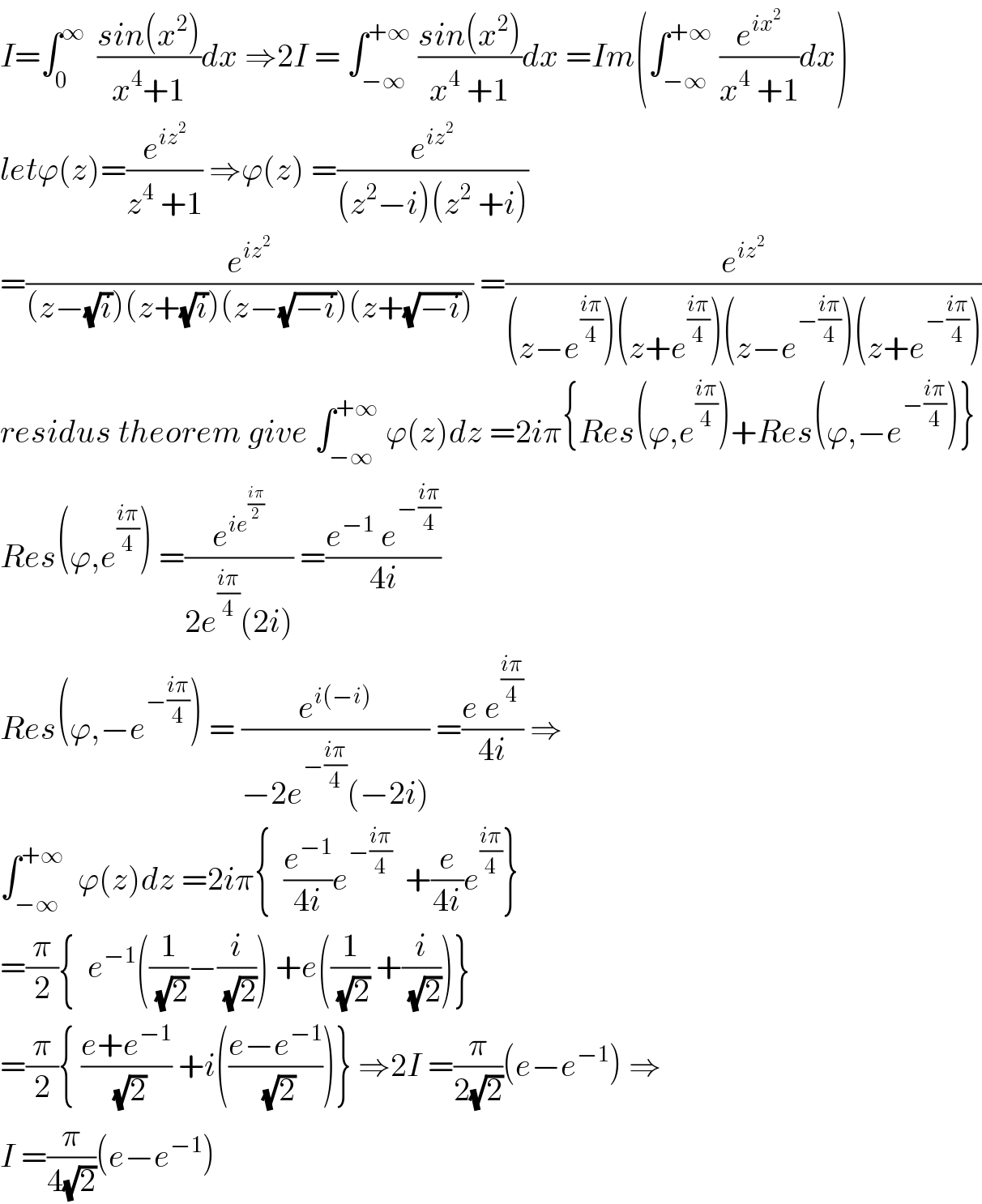Question Number 85999 by M±th+et£s last updated on 26/Mar/20

$$\int_{\mathrm{0}} ^{\infty} \frac{{sinx}^{\mathrm{2}} }{\mathrm{1}+{x}^{\mathrm{4}} }{dx}=\mathrm{0}.\mathrm{4009} \\ $$$${prove}\:{that} \\ $$
Commented by MJS last updated on 26/Mar/20

$$\mathrm{sin}\:\left({x}^{\mathrm{2}} \right)\:\mathrm{or}\:\left(\mathrm{sin}\:{x}\right)^{\mathrm{2}} ? \\ $$
Commented by john santu last updated on 26/Mar/20

$${may}\:{be}\:\mathrm{sin}\:\left({x}^{\mathrm{2}} \right) \\ $$
Commented by M±th+et£s last updated on 26/Mar/20

$${sin}\left({x}^{\mathrm{2}} \right)\: \\ $$
Commented by mathmax by abdo last updated on 26/Mar/20

$${I}=\int_{\mathrm{0}} ^{\infty} \:\:\frac{{sin}\left({x}^{\mathrm{2}} \right)}{{x}^{\mathrm{4}} +\mathrm{1}}{dx}\:\Rightarrow\mathrm{2}{I}\:=\:\int_{−\infty} ^{+\infty} \:\frac{{sin}\left({x}^{\mathrm{2}} \right)}{{x}^{\mathrm{4}} \:+\mathrm{1}}{dx}\:={Im}\left(\int_{−\infty} ^{+\infty} \:\frac{{e}^{{ix}^{\mathrm{2}} } }{{x}^{\mathrm{4}} \:+\mathrm{1}}{dx}\right) \\ $$$${let}\varphi\left({z}\right)=\frac{{e}^{{iz}^{\mathrm{2}} } }{{z}^{\mathrm{4}} \:+\mathrm{1}}\:\Rightarrow\varphi\left({z}\right)\:=\frac{{e}^{{iz}^{\mathrm{2}} } }{\left({z}^{\mathrm{2}} −{i}\right)\left({z}^{\mathrm{2}} \:+{i}\right)} \\ $$$$=\frac{{e}^{{iz}^{\mathrm{2}} } }{\left({z}−\sqrt{{i}}\right)\left({z}+\sqrt{{i}}\right)\left({z}−\sqrt{−{i}}\right)\left({z}+\sqrt{−{i}}\right)}\:=\frac{{e}^{{iz}^{\mathrm{2}} } }{\left({z}−{e}^{\frac{{i}\pi}{\mathrm{4}}} \right)\left({z}+{e}^{\frac{{i}\pi}{\mathrm{4}}} \right)\left({z}−{e}^{−\frac{{i}\pi}{\mathrm{4}}} \right)\left({z}+{e}^{−\frac{{i}\pi}{\mathrm{4}}} \right)} \\ $$$${residus}\:{theorem}\:{give}\:\int_{−\infty} ^{+\infty} \:\varphi\left({z}\right){dz}\:=\mathrm{2}{i}\pi\left\{{Res}\left(\varphi,{e}^{\frac{{i}\pi}{\mathrm{4}}} \right)+{Res}\left(\varphi,−{e}^{−\frac{{i}\pi}{\mathrm{4}}} \right)\right\} \\ $$$${Res}\left(\varphi,{e}^{\frac{{i}\pi}{\mathrm{4}}} \right)\:=\frac{{e}^{{ie}^{\frac{{i}\pi}{\mathrm{2}}} } }{\mathrm{2}{e}^{\frac{{i}\pi}{\mathrm{4}}} \left(\mathrm{2}{i}\right)}\:=\frac{{e}^{−\mathrm{1}} \:{e}^{−\frac{{i}\pi}{\mathrm{4}}} }{\mathrm{4}{i}} \\ $$$${Res}\left(\varphi,−{e}^{−\frac{{i}\pi}{\mathrm{4}}} \right)\:=\:\frac{{e}^{{i}\left(−{i}\right)} }{−\mathrm{2}{e}^{−\frac{{i}\pi}{\mathrm{4}}} \left(−\mathrm{2}{i}\right)}\:=\frac{{e}\:{e}^{\frac{{i}\pi}{\mathrm{4}}} }{\mathrm{4}{i}}\:\Rightarrow \\ $$$$\int_{−\infty} ^{+\infty} \:\:\varphi\left({z}\right){dz}\:=\mathrm{2}{i}\pi\left\{\:\:\frac{{e}^{−\mathrm{1}} }{\mathrm{4}{i}}{e}^{−\frac{{i}\pi}{\mathrm{4}}} \:\:+\frac{{e}}{\mathrm{4}{i}}{e}^{\frac{{i}\pi}{\mathrm{4}}} \right\} \\ $$$$=\frac{\pi}{\mathrm{2}}\left\{\:\:{e}^{−\mathrm{1}} \left(\frac{\mathrm{1}}{\:\sqrt{\mathrm{2}}}−\frac{{i}}{\:\sqrt{\mathrm{2}}}\right)\:+{e}\left(\frac{\mathrm{1}}{\:\sqrt{\mathrm{2}}}\:+\frac{{i}}{\:\sqrt{\mathrm{2}}}\right)\right\} \\ $$$$=\frac{\pi}{\mathrm{2}}\left\{\:\frac{{e}+{e}^{−\mathrm{1}} }{\:\sqrt{\mathrm{2}}}\:+{i}\left(\frac{{e}−{e}^{−\mathrm{1}} }{\:\sqrt{\mathrm{2}}}\right)\right\}\:\Rightarrow\mathrm{2}{I}\:=\frac{\pi}{\mathrm{2}\sqrt{\mathrm{2}}}\left({e}−{e}^{−\mathrm{1}} \right)\:\Rightarrow \\ $$$${I}\:=\frac{\pi}{\mathrm{4}\sqrt{\mathrm{2}}}\left({e}−{e}^{−\mathrm{1}} \right) \\ $$
Commented by mind is power last updated on 27/Mar/20
![Sir for θ∈[(π/2),π] C=Re^(iθ) (e^(iz^2 ) /(1+z^4 ))=(e^(iR^2 (cos(2θ)+isin(2θ))) /(1+R^4 e^(4iθ) ))=(e^(−R^2 sin(2θ)) /(1+R^4 e^(4iθ) )) ,sin(2θ)<0 lim_(R→∞) ∫_C (e^(iz^2 ) /(1+z^4 ))dz #0](https://www.tinkutara.com/question/Q86171.png)
$${Sir}\:\:\:{for}\:\theta\in\left[\frac{\pi}{\mathrm{2}},\pi\right]\:\:\:{C}={Re}^{{i}\theta} \\ $$$$\frac{{e}^{{iz}^{\mathrm{2}} } }{\mathrm{1}+{z}^{\mathrm{4}} }=\frac{{e}^{{iR}^{\mathrm{2}} \left({cos}\left(\mathrm{2}\theta\right)+{isin}\left(\mathrm{2}\theta\right)\right)} }{\mathrm{1}+{R}^{\mathrm{4}} {e}^{\mathrm{4}{i}\theta} }=\frac{{e}^{−{R}^{\mathrm{2}} {sin}\left(\mathrm{2}\theta\right)} }{\mathrm{1}+{R}^{\mathrm{4}} {e}^{\mathrm{4}{i}\theta} }\:\:,{sin}\left(\mathrm{2}\theta\right)<\mathrm{0} \\ $$$$\underset{{R}\rightarrow\infty} {\mathrm{lim}}\int_{{C}} \frac{{e}^{{iz}^{\mathrm{2}} } }{\mathrm{1}+{z}^{\mathrm{4}} }{dz}\:\:#\mathrm{0} \\ $$$$ \\ $$
